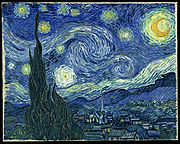 Many creative people suffer from mental illness. Some, however, are unable to produce due to the severity of their disorder. Are the two traits linked?
Many creative people suffer from mental illness. Some, however, are unable to produce due to the severity of their disorder. Are the two traits linked?
A Mental Health Minute by Cristina Frick
A wealth of research suggests that mood disorders are linked to increased creativity. Creative people have a higher rate of bipolar disorder and depression than the general population, and one study found that children of parents with bipolar disorder scored higher on creativity tests than those whose parents did not have the illness. Creative types also have more personality traits in common with those who have a mental illness than with less creative individuals.
The cause of the potential link between these qualities is debated, and some research suggests it may not be a direct one. A third factor could be causing both traits, such as a genetic predisposition or tendency to ruminate. Other explanations include artists’ use of creative pursuits as self-therapy or depression as an inspiration for artistic works.
The results of these studies could have important treatment implications. The Merck Manual of Diagnosis and Therapy, the world’s best-selling medical textbook, suggests that those with cyclothymic disorder, a milder form of clinical depression, may be well-served by pursuing a creative career. In addition, art therapy is frequently used to treat mood disorders.
On the other hand, some experts believe that mental illness decreases creativity. Researcher Shelley Carson contends that artists are often unable to work during periods of intense depression and that the period of remission produces the most inventive works.

Despite the substantial research suggesting that mental illness is linked to increased creativity, there is also evidence to the contrary. It is important to determine if and how the link is activated because it can shed light on treatment options. So do mood disorders help or hinder creativity, and at what point do the symptoms of a mood disorder become maladaptive rather than productive?
My Take
My review of the research has convinced me that mood disorders can make people more creative, but only if they are receiving proper treatment so they can channel their emotions positively rather than being overwhelmed by them. Some may be receiving more effective interventions, or they may be taught to use means such as writing or painting as a coping skill, while others may not. This could be the difference between adaptively and creatively channeling mood disorder symptoms and being overwhelmed by the illness. I also believe that mental illness is more likely to impede creativity when an individual is having trouble functioning adaptively in several areas of his or her life.
And how exactly are mood disorders and creativity related? I believe that the rumination involved in both pursuits is the main relationship, but I also believe it is because many clients use creativity as a coping skill.
Creative treatments have much to offer the suffering. Practices such as writing can provide people with a way to record and notice their thought patterns so they can change dysfunctional thoughts. Writing, painting, photography, sculpture, and other creative pursuits can also provide an outlet for difficult emotions. It is important to make sure that activities such as writing, which is a reflective activity, do not lead to increased rumination about negative emotions. This is where the relationship between clinician and client is key.
It would be interesting to conduct a study that tests levels of creativity before and after a client is taught creative coping skills. This would make it easier to see whether it is treatment effects or inherent levels of creativity that are presented in those with mental illness. It is also important to note that it is difficult to define creativity, as it can encompass many things, including architecture, scientific discoveries, painting, music, writing, etc. It also makes it hard to study using objective measures, although some exist. More research is imperative on this topic. If more research is not conducted, we, as psychologists, could miss an important opportunity to define the connection between creativity and mental illness.
IMPORTANT MESSAGE: If you are feeling depressed or think you might be suffering from a mental illness, the APA website offers a listing of therapists in every state. If you are feeling suicidal, or if you know someone who is, (warning signs include marked changes in sleeping or eating patterns, profound sadness or expressions of hopelessness, giving away belongings/saying goodbye to others, a sudden and inexplicable lifting of depression because the person may mistakenly feel they have found “a way out”), please get help. Call the Suicide Hotline at 1-800-SUICIDE or 1-800-273-TALK. There is help and hope available. You can get better. Call now.
 Cristina Frick has worked as a contributing writer and editor volunteering at the Good News Network since 2006. She is currently completing her Master’s degree in Clinical and Community Psychology at the University of North Carolina at Charlotte and plans to gradute in December. View a list of all of Cristina’s articles here — including previous columns in her Mental Health Minute series.
Cristina Frick has worked as a contributing writer and editor volunteering at the Good News Network since 2006. She is currently completing her Master’s degree in Clinical and Community Psychology at the University of North Carolina at Charlotte and plans to gradute in December. View a list of all of Cristina’s articles here — including previous columns in her Mental Health Minute series.



















Dear Cristina:
It is interesting that researchers now have a theory that rumination is the quality that links creativity and mental illness. I was frankly surprised.
I would suggest that rumination cannot be the whole story, as there are many people suffering from depressions and mental illness who have repetitive and/or heavily focused thought patterns, but are not the next Michelangelo.
Kay Redfield Jamison’s study, “Touched By Fire” on manic-depression (bipolar disorder) and creativity has meticulous pedigrees for many families filled with writers and artists. One of her suggestions that the dendritic (branching quality) of thought when people are manic and hypomanic leads to new artistic and scientific discoveries.
The problem is that if the mania is not treated, the patient can then enter a very dangerous state.
I would also suggest that for many depressed creative individuals that I have known, the terrible melancholy of the depressions does give an intensity of personal vision that enhances their creativity in ways that more placid people seldom experience.
But again, unmedicated and untherapized depressions can be quite dangerous.
The trick is to find the right level of medication and/or therapy so the creative person can continue to produce good work.
Cordially,
Robin
Hi Robin,
Thank you for your thoughtful comments:-) First, I was so excited to hear you mention “Touched By Fire” because I recently discovered it as I was doing thesis research. I plan on getting it and reading it for my thesis soon.
You make a very good point that rumination cannot be the whole story because not all people who ruminate become great artists and vice versa. The idea of the dendritic quality sounds really interesting, and I can’t wait to read about it soon. I also agree that in some cases depression can contribute to personal vision, though I think there are many people who have not suffered from depression who are equally creative.
I definitely agree that no matter what the cause and regardless of the link with creativity, it is always important for people with mental illnesses to get proper treatment because mental illness can be very dangerous. People also need proper treatment so they can channel their energies creatively rather than being overwhelmed by the disorder.
Thanks again for your comment, and have a great week- I will definitely let you know as soon as I have read “Touched By Fire!”:-)
-Cristina